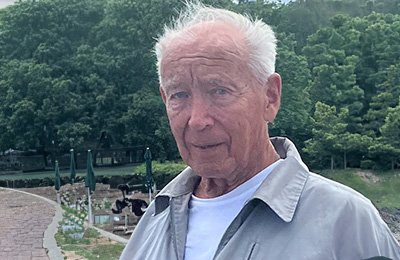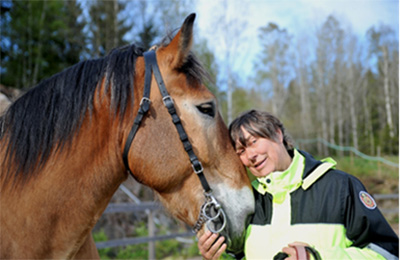The 5th Nordic Research Seminar on Equine-assisted Interventions 2024
In September, the Swedish organization of Equine-assisted interventions (OHI) and Halmstad University welcomed participants to the 5th Nordic seminar on Equine-assisted interventions 2024. The seminar was held in the form of a two-day conference embracing Equine-assisted interventions to support health, learning, and activity irrespective of physical or mental disability.

On September 12–13, 2024, Halmstad University had the pleasure of hosting the 5th Nordic Research Seminar on Equine-assisted Interventions with the theme Equine-assisted interventions for sustainable health, performance and participation. The conference welcomed researchers, practitioners, and stakeholders in the field of equine assisted interventions as well as decision makers and politicians at various levels within the health care sector and related areas.
The conference aimed to offer the participants access to recent research results and the opportunity to exchange experiences regarding equine assisted interventions in the field of sustainable health, learning and activities for all members of society. The topic of evidence-based practice is an important fundamental aspect and constitutes a unique opportunity to define areas that need to be established with the help of high-quality research and development work as well as collaboration in and around equine-assisted services. The seminar was an exclusive opportunity for both researchers and practitioners from all over the Nordic countries to jointly increase knowledge about equine assisted interventions.
Programme day 1
09:30–10.00 – Registration
10.00–10.15 – Introduction
Maria Vilain Rørvang, Associate professor at Swedish University of Agricultural Sciences, Elisabeth Argentzell, PhD and Associate professor at Lund University, Henrika Jormfeldt, Professor at Halmstad University/ member of OHI research Group
10.15–10.45 – Keynote Speaker
Holistic Equine-assisted services in a specialised health care and support system
– barriers and benefits
Henrika Jormfeldt, Professor of nursing, School of health and welfare, Halmstad University
11.00–12.00 – Part 1: Peer reviewed oral presentation on “Equine Assisted interventions – Relationships to Promote Health and Recovery”
Moderator: Elisabeth Argentzell
See information about the programme item further down.
12.00–13.30 Lunch and exhibition
13.30–14.00 Keynote Speaker
Norwegian perspective on Equine Assisted Interventions in social exclusion, addiction, and dementia
Tobba Therkildsen Sudmann, Professor at Faculty of Health and Social Sciences, Western Norway University of Applied Sciences in Bergen, Norway
14.00–15.00 Part 2: Peer reviewed oral presentation on on “Experiences from equine-assisted and nature-based interventions”
Moderator: Elisabeth Argentzell
See information about the programme item further down.
15.00–15.30 Coffee break and exhibition
15.30–16.30 Part 3: Peer reviewed oral presentation on on “Impact of Equine assisted interventions”
Moderator: Henrika Jormfeldt
See information about the programme item further down.
16.45–17.30 Keynote Speaker
Clinical Conceptualization and a Trauma-Informed Approach to Equine Interactions in Therapy Services: A Nordic Perspective on Developments in America
Nina Ekholm Fry, Director of Equine Programs at University of Denver's Institute for Human-Animal Connection
19.00 Dinner with entertainment at Halmstad Plaza
Jubilee Dinner and ceremony held by OHI with speeches, announcing honorary member and singing
Part 1: peer reviewed oral presentations on “Equine Assisted interventions – Relationships to Promote Health and Recovery”
Moderator: Elizabeth Argentzell
Taking a One Health approach to Equine Assisted Interventions by engaging a multispecies triad perspective.
Andrea Petitt, University of Liège, Belgium
Henrik Lerner, Department of Health Care Sciences, Marie Cederschiöld University, Sweden.
Horses in Equine-Assisted Services – working on a relationship toward Human Health.
Inês Pereira-Figueiredo, ThekidsFellows Research Group in Anthrozoology, Portugal and Institute of Neurosciences of Castilla y León, Spain and University of Salamanca, Spain.
Tiago Mendonça, ThekidsFellows Research Group in Anthrozoology, Portugal and Faculty of Veterinary Medicine, Lusófona University, Portugal and Animal and Veterinary Research Center (CECAV), Faculty of Veterinary Medicine, Lusófona University – Lisbon University Center, Portugal.
Ana Rita Matias, ThekidsFellows Research Group in Anthrozoology, Portugal and Faculty of Veterinary Medicine, Lusófona University, Portugal.
Graça Duarte Santos, ThekidsFellows Research Group in Anthrozoology, Portugal and Faculty of Veterinary Medicine, Lusófona University, Portugal.
Equine Assisted Psychological Treatment (EAPT) according to CBT and ACT in a primary care context
Emma Lindeblad, Clinical psychologist and psychotherapist in CBT; PhD in Psychology, Region Kronoberg och Linnéuniversitetet, Sweden
Experiences of Equine-assisted psychotherapy (EAP) from Stallen Gaustad at Oslo University Hospital.
Christina Thorpe, nurse and equine-assisted therapist at Stallen Gaustad, Oslo University Hospital, Norway
Part 2: peer reviewed oral presentations on “Experiences from equine-assisted and nature-based interventions”
Moderator: Elisabeth Argentzell
A therapeutic equine-assisted group intervention- experiences among people with common mental disorders on sick leave.
Linda Fridén, PhD-student, Halmstad University, Sweden
Equine assisted education for students with problematic school situations
Malin Larsson, MSc in agriculture with a major in animal science MSc in environmental psychology, Swedish University of Agricultural Sciences, Sweden
Young people's experiences of Equine-Facilitated Therapy (EFT) in promoting psychological functioning
Hanna Huttunen, Occupational Therapist, Equine-Facilitated Therapist, Master´s Degree in Health Sciences University of Oulu, Finland
Participation and inclusion for persons with intellectual disabilities in horse related activities
Marie Gustavsson & Susanne Larsson, Division of Social Work, Department of Culture and Society, Linköping university, Sweden
Part 3: Peer reviewed oral presentations on “Impact of Equine assisted interventions”
Animal-assisted and nature-based intervention with horses for young adults with autism and social withdrawal, A feasibility study with a health economic perspective
Sara Holmberg, MD, associate professor, Department of Research and Development, Region Kronoberg, Sweden.
A process of embodied recovery from stress-related mental health problems. Exploring and explaining the process of personal recovery from participating in a nature-based intervention including equine-assisted therapy.
Marie Gudmundsson, PhD student, Department of Health Sciences, Lunds Universitet, Sweden
The movement of the horse building parameters of walk for chronic low back pain patients (CLBP)
Mattila-Rautiainen Sanna, Biomedicine, University of Eastern Finland, Finland.
Physiotherapists’ experiences of Equine assisted therapy: A way to reach several levels of movement simultaneously
Matilda Uggla, Master’s Programme in Physiotherapy (2023), Umeå University, Sweden.
Programme day 2
09.00–09.30 – Keynote speaker
Horses in Compulsory treatment - A summary from 60 years of Equine assisted interventions
Sven Forsling, Psychologist, researcher and honorary member of OHI
09.30–10.00 – Keynote Speaker
Development of Equine Assisted Interventions in Sweden – milestones and challenges
Margareta Håkanson, Licensed physical therapist, med licentiate degree, OHI Research Network
10.00–10.30 Coffee Break and exhibition
10.30–11.30 Panel dialogue
Panel dialogue led by The Swedish Horse Industry Foundation (HNS) with representatives of politics, OHI, researchers and practitioners in the field regarding what needs to be done to make Equine-assisted interventions available to those who need it. The panel dialogue will be held in Swedish, while the dialogue with the panel will be summarized and translated into English.
11.30–12.00 Closure and information
Closure and information about upcoming conference/seminar regarding Nature based health at SLU Alnarp 2025
12.00–13.20 Lunch and exhibition
13.20–15.00 – Workshops
Workshops in smaller groups based on, geographical or activity-specific focus
15.00–15.10 Take away fika and goodbye
Keynote speakers
Henrika Jormfeldt

Henrika Jormfeldt, licensed specialist nurse specializing in psychiatry and mental health, Professor of Nursing at the Halmstad University and certified by OHI (the Organization of Equine-assisted Intervention) to perform horse-assisted interventions. Henrika is a member of the HETI executive committee (The Federation of Horses in education and Therapy International) and has over 50 years of experience with horses. Her recent research is about equine assisted interventions for people with mental health condition through lifespan and she runs equine-assisted therapy on a small scale at “Braddared's horse” with three horses involved that are all her own breeding’s.
Tobba Therkildsen Sudmann

Tobba Therkildsen Sudmann, full Professor of Public Health, physiotherapist and medical sociologist, and academic head of the PhD-program Health, functioning and participation at Western Norway University of Applied Sciences. She has her own adjunct practice where she offers equine-facilitated physiotherapy. Her research focus on how people use their bodily resources to enhance their well-being and social participation, whether the means are in- or outdoor physical activity, technology, nature, or horses. Professor Sudmann is currently studying physical activities for persons with dementia, crisis shelters for persons with substance dependency, horses in mental health work (including substance use), and green social work with horses.
Nina Ekholm Fry

Nina Ekholm Fry is the Director of Equine Programs at University of Denver’s Institute for Human-Animal Connection in Denver in Colorado (USA) and a faculty member in the Graduate School of Social Work and the Graduate School of Professional Psychology. She is the coordinator of the Human-Animal-Environment Interactions in Social Work specialization within the Master of Social Work program and leads the Post-Master’s Equine-Assisted Mental Health Practitioner Certificate program. For the past 15 years, her work has included animals in human services with a focus on equine interactions in psychotherapy and counseling. Nina serves as an advisor to the State of Massachusetts Bureau of Substance Addiction Services on matters related to mental health services in green environments. She has a background as a psychologist specializing in trauma treatment and as an equine behavior consultant. Nina has a particular interest in applied ethics and social justice perspectives within human-animal interactions and is actively engaged in national and international organizations for both human and equine wellbeing.

Sven Forsling
Sven Forsling is a psychologist and researcher. He holds an American farrier training and has worked as a research assistant to Gunnar Borg (The Borg Scale), and he has had a lifetime working relationship with Richard Blum at University of Berkeley and University of Stanford in California. Forsling has been the chief psychologist for §12 – care within Stockholm County Council, and a member of the scientific council at the state board of institutions (SiS). He was the head of department for the home for girls in compulsory care “Stall Frossarbo” during the period between 1987 to 1999. He wrote the book “444 Stockholmsungdomar i kris” [444 Stockholm youths in crisis] 1987”. In 1998 he was awarded the foundation “Allmänna Barnhuset's” big prize for his efforts for socially disadvantaged young people. He is the author of “Flickan och hästen” (2001) translated to “The Girl and the Horse” (2003).
Margareta Håkanson

Margareta Håkanson, OHI certified physiotherapist, clinical specialist in psychiatry and psychosomatics, certified in Balance in Movement and has a medical licentiate degree in public health at the University of Gothenburg. She participated in clinical research in physiotherapy regarding group treatment for patients suffering from stress related symptoms like chronic pain and anxiety and on equine assisted physiotherapy for patients suffering from eating disorders and from low back pain. She was project leader for the project ”Animals and human health” at the Swedish University for Agricultural Sciences (SLU). She has also been involved in development of OHI certification process, survey of EAI providers, multiprofessional education and have been teaching on human animal interaction and equine assisted interventions. OHI research group was founded to assemble the academic resources within OHI and create a meeting point for the diverse professions and disciplines spread all over Sweden and its universities. One outcome from the groups meetings is this 5th Nordic research seminar.
Halmstad University – where different perspectives meet
Halmstad University prepares people for the future by creating values, driving innovation and developing society. Since the beginning in 1983, the University has been characterised as forward-thinking and cross-border. Halmstad University is known for its popular and reality-based programmes and small student groups. Today, the University has around 11,000 students (approximately 5,200 full-time students) and offers around 50 programmes and over 130 courses within several subject fields.
Research for innovation
The research at Halmstad University is internationally renowned and is pursued in interdisciplinary innovation and research environments. The University takes an active part in the development of society through extensive and recognised collaboration with both the private and public sector.
Experience Sweden, Halland and Halmstad
Funding and financiers
This conference was made possible with the help of funding from the following financiers:
Collaboration partners




